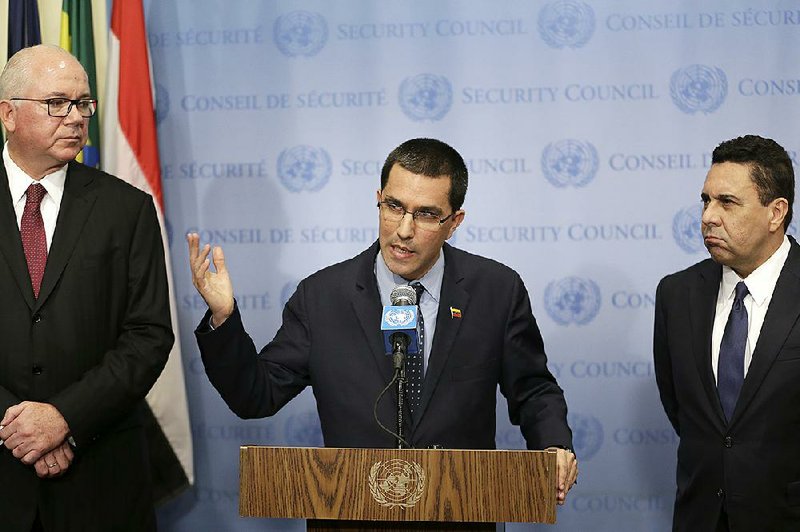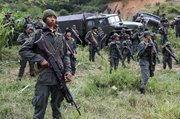CARACAS, Venezuela -- The Trump administration on Friday slapped extensive financial sanctions on Venezuela, ratcheting up tensions between the two countries and making it harder for President Nicolas Maduro to raise badly needed funds to prevent a debt default.
The sanctions President Donald Trump signed by executive order prohibit financial institutions from providing new money to the government or state oil company PDVSA. It would also restrict PDVSA's U.S. subsidiary, Citgo, from sending dividends back to Venezuela, as well as ban trading in two bonds the government recently issued to circumvent its increasing isolation from Western financial markets.
"These measures are carefully calibrated to deny the Maduro dictatorship a critical source of financing to maintain its illegitimate rule, protect the United States financial system from complicity in Venezuela's corruption and in the impoverishment of the Venezuelan people, and allow for humanitarian assistance," the White House said in a statement.
Maduro vowed Friday to prosecute for treason opponents he accused of being behind the sanctions.
[PRESIDENT TRUMP: Timeline, appointments, executive orders + guide to actions in first 200 days]
He accused Trump of trampling on international law and relations with Latin America by taking actions that he said would cause "great damage" to the Venezuelan oil economy as well as American investors who own the country's bonds.
He singled out the president of Venezuela's opposition-controlled congress, Julio Borges, as being the "mastermind" of the financial and economic "blockade" and called on the government-stacked supreme court and a new, all-powerful constitutional assembly to initiate proceedings against opponents who have lobbied in favor of the sanctions.
"You've got to be a big traitor to your country to ask for sanctions against Venezuela," Maduro said in a televised appearance.
Trump officials stressed that by leaving untouched crude shipments between the United States and Venezuela, the sanctions were targeting Maduro and his allies, not the Venezuelan people.
"Maduro may no longer take advantage of the American financial system to facilitate the wholesale looting of the Venezuelan economy at the expense of the Venezuelan people," Treasury Secretary Steven Mnuchin said at the White House. "These measures will undermine Maduro's ability to pay off political cronies, and regime supporters, and increase pressure on the regime to abandon it's disastrous path."
The sanctions follow through on Trump's threat last month that he would take strong economic actions if Maduro's increasingly authoritarian government went ahead with plans to create a constitutional assembly that is made up of government loyalists. The opposition boycotted the vote to elect the body's 545 delegates.
Since the assembly was seated, it has voted by acclamation to oust the nation's outspoken chief prosecutor, take lawmaking powers from the opposition-controlled congress and create a "truth commission" that many fear will be used to target the government's political opponents. Several prominent opposition mayors have also been removed or ordered arrested by the government-stacked supreme court.
The constitutional assembly announced Friday on Twitter that the "truth commission" had initiated an investigation to determine who was behind the sanctions. Assembly President Delcy Rodriguez said the "unpatriotic right" would "respond before the people."
The commission wields unusual authority to subpoena and prosecute those suspected of wrongdoing.
"It appears the United States wants to govern Latin America," said Foreign Minister Jorge Arreaza, speaking at the United Nations Security Council. "Maduro has grown tired of calling for dialogue with the U.S. president. God willing, President Trump understands it's time for dialogue."
He called the new U.S. sanctions "the worst aggressions to Venezuela in the last 200 years, maybe."
Vice President Mike Pence signaled the United States' move earlier Friday, tweeting that the U.S. "will not stand by as Venezuela crumbles."
"The birthright of the Venezuelan people has always been and will always be libertad," he wrote, using the Spanish word for "freedom."
The sanctions are likely to worsen a crisis that has already seen Venezuela's oil-dependent economy shrink by about 35 percent since 2014 -- more than the U.S. economy did during the recession.
Maduro, who is among some 30 senior officials already barred from the United States, had warned this week that the Trump administration was readying a "commercial, oil and financial blockade" in the mold of the one that has punished Cuba for decades.
He said it would be meant to pave the way for a U.S. military intervention.
Maduro is already struggling to ease widespread shortages and triple-digit inflation as oil production has tumbled to its lowest level in more than two decades. Any economic sanctions, however mild, increase the risk of a default on Venezuela's ballooning debt.
The government and PDVSA have about $4 billion in debt payments due before the end of the year but only $9.7 billion in international reserves on hand, the vast majority consisting of gold ingots that are hard to trade immediately for cash.
Venezuela has taken steps to remain current on its debt throughout the economic crisis, and the president has blamed his enemies for spreading rumors about any impending default.
But Mnuchin said at a briefing that Maduro "has financed his regime by hollowing out Venezuela, through economic mismanagement, corruption and the assumption of onerous debt."
Information for this article was contributed by Jennifer Peltz of The Associated Press and by Katia Porzecanski, Toluse Olorunnipa, Nick Wadhams, Camila Russo, Jose Enrique Arrioja and Jennifer Jacobs of Bloomberg News.
A Section on 08/26/2017


